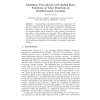Free Online Productivity Tools
i2Speak
i2Symbol
i2OCR
iTex2Img
iWeb2Print
iWeb2Shot
i2Type
iPdf2Split
iPdf2Merge
i2Bopomofo
i2Arabic
i2Style
i2Image
i2PDF
iLatex2Rtf
Sci2ools
ESANN
2008
2008
Multilayer Perceptrons with Radial Basis Functions as Value Functions in Reinforcement Learning
Using multilayer perceptrons (MLPs) to approximate the state-action value function in reinforcement learning (RL) algorithms could become a nightmare due to the constant possibility of unlearning past experiences. Moreover, since the target values in the training examples are bootstraps values, this is, estimates of other estimates, the chances to get stuck in a local minimum are increased. These problems occur very often in the mountain car task, as showed by Boyan and Moore [2]. In this paper we present empirical evidence showing that MLPs augmented with one layer of radial basis functions (RBFs) can avoid these problems. Our experimental testbeds are the mountain car task and a robot control problem.
ESANN 2008 | Mountain Car Task | Multilayer Perceptrons | Neural Networks | State-action Value Function |
| Added | 29 Oct 2010 |
| Updated | 29 Oct 2010 |
| Type | Conference |
| Year | 2008 |
| Where | ESANN |
| Authors | Victor Uc Cetina |
Comments (0)

